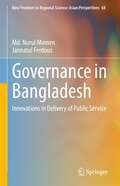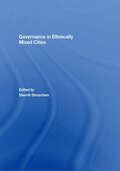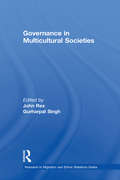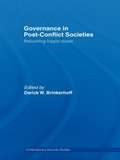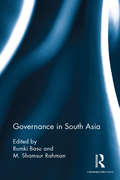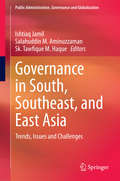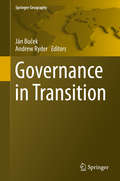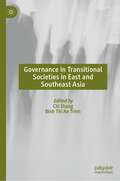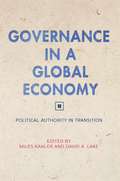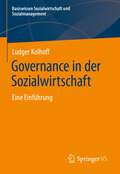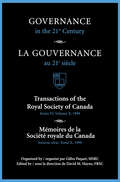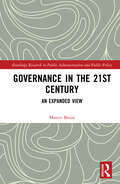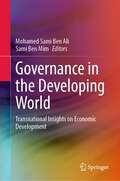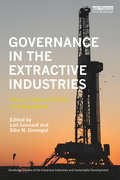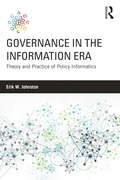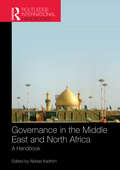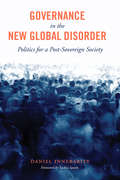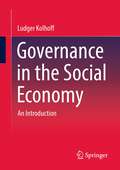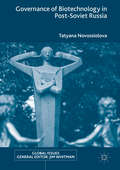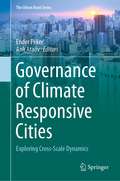- Table View
- List View
Governance for the Environment
by Magali A. Delmas Oran R. YoungWe live in an era of human-dominated ecosystems in which the demand for environmental governance is rising rapidly. At the same time, confidence in the capacity of governments to meet this demand is waning. How can we address the resultant governance deficit and achieve sustainable development? This book brings together perspectives from economics, management, and political science in order to identify innovative approaches to governance and bring them to bear on environmental issues. The authors' analysis of important cases demonstrates how governance systems need to fit their specific setting and how effective policies can be developed without relying exclusively on government. They argue that the future of environmental policies lies in coordinated systems that simultaneously engage actors located in the public sector, the private sector, and civil society. Governance for the Environment draws attention to cutting-edge questions for practitioners and analysts interested in environmental governance.
Governance in Bangladesh: Innovations in Delivery of Public Service (New Frontiers in Regional Science: Asian Perspectives #68)
by Md. Nurul Momen Jannatul FerdousThis book adopts the multidimensional nature of innovation as its point of focus and offers a comprehensive analysis of contemporary governance issues in Bangladesh. Each chapter views those issues from its own disciplinary perspective, but all share a common focus on the current process in the governance of innovation. The authors show how the processes of innovation and public service delivery are influenced while there is simultaneously a striving for a digital Bangladesh. The book presents innovation as a complex phenomenon with multidisciplinary viewpoints affecting its governance. As well, new practices, developments, and empirical research are shown here. The aim is to point out the most persistent difficulties in public administration and public service delivery, with an emphasis on how to deliver public service in Bangladesh in a sustainable manner. Although significant transformations have been made recently for a better organized public sphere, public services still must be more closely in line with what citizens need rather than what service providers are prepared to deliver. This published work speaks strongly to a wide-ranging audience, from scholars of governance and innovation management to academics, researchers, and postgraduate students interested in public service delivery innovations in Bangladesh and South Asia. Indeed, the book serves as a text and valuable resource for postgraduate courses in politics, business administration, economics, political science, development, and governance in South Asia.
Governance in Ethnically Mixed Cities (ISSN)
by Sherrill StroscheinThis collection of original essays breaks new ground by examining the dynamics of ethnic politics at the local level, rather than following in the footsteps of many previous studies which focus on the macropolitical level of states and nations. Governance in Ethnically Mixed Cities is based on extensive fieldwork and local observation, providing perspectives from a range of academic disciplines including Political Science, Geography, and Anthropology. It covers a variety of geographic areas from the Middle East (Kirkuk, Haifa, and Tel Aviv-Jaffa) to Europe (Mostar, Bolzano, Toulouse, and Florence), Central Asia (Osh in Kyrgyzstan) and the United States (Durham, North Carolina). In spite of the variety of disciplinary approaches and geographic diversity of the case studies, the contributing authors uncover a number of common elements of local ethnopolitical dynamics in mixed cities: the power of informal institutions, the effect of numerical balances between groups on local politics, and the significance of local competition for material and symbolic resources. Each of these areas provides a promising avenue for future research.
Governance in Multicultural Societies (Research in Migration and Ethnic Relations Series)
by Gurharpal SinghIn the last decade the study of multiculturalism has become an established field in political and social theory. This in-depth and engaging volume focuses on public policy and the dilemmas faced by the governments of increasingly diverse societies. Offering a theoretically and empirically rich collection of essays from some of the leading specialists in the field, it fills the gap between the social and political theory of multiculturalism and institutionally based national case studies. The book is distinctive in combining a robust theoretical introduction to recent developments in multiculturalism with a critical evaluation of contemporary public policy in a variety of countries in Europe, South Asia, Southeast Asia, the Far East and South Africa. It incorporates a strong comparative dimension both within and across the case studies, with a regional focus enabling comparisons of regional, national and international experience.
Governance in Northern Ontario
by Charles Conteh Bob SegsworthThis book analyzes economic development policy governance in northern Ontario over the past thirty years, with the goal of making practical policy recommendations for present and future government engagement with the region. It brings together scholars from several disciplines to address the policy and management challenges in various sectors of northern Ontario's economy, including the mining, pulp and paper, and tourism industries, and both small- and medium-sized businesses.Governance in Northern Ontario assesses the role of the provincial government and its economic policy intervention in the region's economic development. The contributors evaluate the relationship between the provincial and local governments and the business sector, and also looser structures of policy networks, such as those of First Nations and other interested community groups. Focusing on the nature of partnerships between governments and societal interests, Governance in Northern Ontario makes a significant contribution to the theories and practice of public policy governance in socioeconomically disadvantaged regions.
Governance in Post-Conflict Societies: Rebuilding Fragile States (Contemporary Security Studies)
by Derick W. BrinkerhoffForeword Frederick D. Barton Preface Derick W. Brinkerhoff 1. Governance Challenges in Fragile States: Re-Establishing Security, Rebuilding Effectiveness, and Reconstituting Legitimacy Derick W. Brinkerhoff Part 1. Governance and Post-conflict: Perspectives on Core Issues 2. Does Nation Building Work? Reviewing the Record Arthur A. Goldsmith 3. Constitutional Design, Identity and Legitimacy in Post-Conflict Reconstruction Aliza Belman Inbal and Hanna Lerner 4. Election Systems and Political Parties in Post-Conflict and Fragile States Eric Bjornland, Glenn Cowan, and William Gallery 5. Democratic Governance and the Security Sector in Conflict-affected Countries Nicole Ball Part 2. Actors in Governance Reconstruction: Old, New, and Evolving Roles 6. From Bullets to Ballots: The U.S. Army Role in Stability and Reconstruction Operations Tammy S. Schultz and Susan Merrill 7. The Private Sector and Governance in Post-Conflict Societies Virginia Haufler 8. Rebuilding and Reforming Civil Services in Post-Conflict Societies Harry Blair 9. Contributions of Digital Diasporas to Governance Reconstruction in Fragile States: Potential and Promise Jennifer M. Brinkerhoff Part 3. Reforming and Rebuilding Governance: Focus on the Local 10. Decentralization, Local Governance, and Conflict Mitigation in Latin America Gary Bland 11. Subnationalism and Post-conflict Governance: Lessons from Africa Joshua B. Forrest 12. Subnational Administration and State Building: Lessons from Afghanistan Sarah Lister and Andrew Wilder About the Contributors Index
Governance in South Asia
by Rumki Basu M. Shamsur RahmanThis book presents a nuanced analysis of governance in South Asia. It examines a range of themes including civil service reforms, women and development, environmental governance and public sector programmes, together with the impact of globalization on local issues and its influence on governance in the region. Through grass-roots studies, the volume also traces how the last 20 years have seen a social and economic resurgence in South Asia – transiting from stages of poverty, low growth rates, illiteracy and poor health to flourishing economies, improved savings, greater investments and stronger human development indicators. Drawing on extensive fieldwork, this book will be of great interest to scholars of politics and public administration, development studies, labour studies, and sociology and social anthropology. It will also be useful to practitioners in the field, NGOs and civil servants.
Governance in South, Southeast, and East Asia
by Ishtiaq Jamil Salahuddin M. Aminuzzaman Sk. Tawfique M. HaqueThis book explores and analyzes governance and policy issues in South, Southeast, and East Asia. It maps governance challenges and analyzes current trends from the perspectives of democracy, public policy, and public institutions. Regional public administration and governance systems have undergone some phenomenal changes over the last three decades and have played a key role in the economic progress of the area, especially in the Southeast and East Asian nations. Rich with country-specific evidence and analyses, the chapters in the book apply empirical and other research methods to examine shifting paradigms and best practices. This book develops an understanding of changes in the forms, process and practices of governance, both within the context of each nation and in a comparative perspective. The book will appeal to scholars, academics, students, and practitioners of public administration, political science, and policy issues.
Governance in Transition
by Ján Buček Andrew RyderThis book looks at experience in government restructuring and devolution from a variety of national and international perspectives, both within the European Union and elsewhere, focusing on lessons learned and ways forward. Since the 1980s, there has been a global trend to give more power to local governments. Even in Korea and the United Kingdom, the most centralised countries in the OECD, local government powers have increased, with substantial economic benefits. Within the European Union, the principle of subsidiarity has enshrined the idea of devolution. New member states, particularly in central and eastern Europe, have significantly created new and self-sufficient local and regional governments. However, this process has been complicated. Devolution is not a panacea in its own right, and need not lead to economic growth. While it can encourage savings through collaboration, it can also lead to confused lines of authority and can complicate policy formation and implantation. Devolution can strain local budgets, forcing local governments to rely on their own sources of finance, rather than central government transfers. Suburbanisation, rural depopulation, the growth of some regions, and the decline of others have raised new problems, particularly related to inter-governmental cooperation among local governments and different levels of government. In many cases, an increased number of governments has increased administrative costs.
Governance in Transitional Societies in East and Southeast Asia
by Chi Zhang Binh Thi An TrinhThis book brings together scholars based in, or had previously been based in a range of East and Southeast Asian countries, building on their respective primary empirical data and first-hand experience as academics and think tank researchers, in order to pluralise the current debates about governance in transitional societies. In an era of global democratic backsliding, this edited volume offers less-explored local perspectives, to balance the Western-centrism observed in area studies and the focus on former Soviet countries in transit. What is the future of governance in Asia? This book, by attempting to supply a diversity of answers, will interest political scientists, economists, and journalists.
Governance in a Global Economy: Political Authority in Transition
by Miles Kahler & David A. LakeCritics of globalization claim that economic integration drains political authority from states: devolving authority to newly empowered regions, delegating it to supranational organizations, and transferring it to multinational firms and nongovernmental organizations. Globalization is also attacked for forcing convergence of state institutions and policies and threatening the ability of societies to chart their own democratically determined courses. In Governance in a Global Economy, Miles Kahler and David Lake assemble the contributions of seventeen leading scholars who have systematically investigated how global economic integration produces changes of governance. These authors conclude that globalization has created a new and intricate fabric of governance, but one that fails to match the stark portrait of beleaguered states. Exploring changes in governance across several policy areas (such as tourism, trade, finance, and fiscal and monetary policy), the authors demonstrate that globalization changes the policy preferences of some actors, increases the bargaining power of others, and opens new institutional options for yet others. By reintroducing agency and choice into our understanding of globalization, this book provides important new insights into the complex and contingent effects of globalization on political authority and governance. The introduction and the conclusion are by the editors; the contributors are James A. Caporaso, Benjamin J. Cohen, Barry Eichengreen, Zachary Elkins, Geoffrey Garrett, Peter Gourevitch, Virginia Haufler, Michael J. Hiscox, Robert O. Keohane, Lisa L. Martin, Walter Mattli, Kathleen R. McNamara, Joseph S. Nye, Jr., Jonathan Rodden, Ronald Rogowski, Beth A. Simmons, and Peter Van Houten.
Governance in der Sozialwirtschaft: Eine Einführung (Basiswissen Sozialwirtschaft und Sozialmanagement)
by Ludger KolhoffIn diesem Lehrbuch werden Governance-Aspekte auf verschiedenen Ebenen verständlich dargestellt und erläutert: Nach einem Blick auf die wirtschafts- und politikwissenschaftlichen Wurzeln der Governance-Diskussion werden auf der Makroebene „Orders of Governance“ politische und ökonomische Aushandlungs- und Problemlösungsprozesse erörtert und institutionelle und normative Rahmenbedingungen betrachtet; auf der Mesoebene „Cooperation“ geht es um Formen der Steuerung und der Kontrolle sowie um die Kooperation und Koordination von sozialwirtschaftlichen Unternehmen; und auf der Mikroebene „Interactions“ wird Governance aus der Perspektive der Akteure und ihrer Interaktionen behandelt.
Governance in the 21st Century / Gouvernance Au 21e Siècle
by David M. HayneThis volume continues the inquiry launched by the Royal Society of Canada's 1997 publication, "Can Canada Survive? Under What Terms and Conditions?", and pursued in the 1998 volume, "The Well-Being of Canada", and the 1999 volume "Survivability in the 21st Century" (all published by the University of Toronto Press). The present collection examines the challenges of governance in our new century.Eight papers, given by experts in their respective fields, call for an examination of the governance of organizations per se, whether one probes the crises in the experience of large corporations, in education, in health care, in science and technology systems, or in military affairs.This volume underlines the dramatic changes taking place in our time and stresses the urgent need for new thinking and the need to reform our governance mechanisms in order to keep pace with our changing world.
Governance in the 21st Century: An Expanded View (Routledge Research in Public Administration and Public Policy)
by Morris BosinIn Governance in the 21st Century, Morris Bosin offers an integrated approach in addressing real world governance challenges. Divided into four broad sections, Bosin begins in Part 1 by introducing the nature of governance, its use in the public and private sector, and at different levels in our society. Part 2covers traditional and emerging approaches to governance and reviews the various epistemological roots that frame our understanding of governance approaches. Part 3 includes a detailed discussion of the three components of his proposed approach to an expanded view of governance – requisite variety, complexity, and reflexivity. Part 4 illustrates the application of this approach through the use of case studies targeted at selected Federal agencies as well as at specific societal issues including the FDA's Drug Review Program, Bureau of Indian Education Program, U.S. Customs and Border Protection, COVID 19, and Police Department Strategies. Crossing traditional disciplinary lines, Bosin’s integrated approach will guide the academic community as well as practitioners toward a more holistic view of governance and offer generic solutions that can be adapted to any number of issues that portend transformational change for society.
Governance in the 21st Century: An Expanded View (Routledge Research in Public Administration and Public Policy)
by Morris BosinIn Governance in the 21st Century, Morris Bosin offers an integrated approach in addressing real world governance challenges.Divided into four broad sections, Bosin begins in Part 1 by introducing the nature of governance, its use in the public and private sector, and at different levels in our society. Part 2covers traditional and emerging approaches to governance and reviews the various epistemological roots that frame our understanding of governance approaches. Part 3 includes a detailed discussion of the three components of his proposed approach to an expanded view of governance – requisite variety, complexity, and reflexivity. Part 4 illustrates the application of this approach through the use of case studies targeted at selected Federal agencies as well as at specific societal issues including the FDA's Drug Review Program, Bureau of Indian Education Program, U.S. Customs and Border Protection, COVID 19, and Police Department Strategies.Crossing traditional disciplinary lines, Bosin’s integrated approach will guide the academic community as well as practitioners toward a more holistic view of governance and offer generic solutions that can be adapted to any number of issues that portend transformational change for society.
Governance in the Developing World: Transnational Insights on Economic Development
by Mohamed Sami Ben Ali Sami Ben MimThis book assesses the extent to which good governance may contribute to enhancing economic performance and social welfare in developing countries, globally. Governance has been pointed out as one of the major weaknesses of developing economies and may largely be attributed to weak governance practices at both the macro- and micro-level. This book highlights the channels through which governance may act on various economic sectors and different key economic variables. In doing so, it enables policymakers to identify and implement policies and procedures to promote good governance. This book provides a transnational perspective on good governance in considering developing countries in Asia, Africa and beyond, presenting respective case studies in single country settings, enabling a comparative perspective between and across all chapters. Covering topics that include the intersection between governance and gender, inequality, poverty, education and health, the book provides diverse theoretical and empirical evidence on important issues facing policymakers, investors and other stakeholders and is relevant to graduate students and researchers interest in policy issues in the developing world.
Governance in the Extractive Industries: Power, Cultural Politics and Regulation (Routledge Studies of the Extractive Industries and Sustainable Development)
by Lori Leonard Siba N. GrovoguiGreater understanding of the forms and consequences of investment and disinvestment in the extractive industries is required as a result of capitalist expansion, recent declines in global commodity prices, and claims that extractive sector projects, especially in the global south, are poverty reduction projects. This book explores emergent forms of governance in mining and extractive industry projects around the world. Chapters examine efforts to govern extractive activities across multiple political scales, through intermediaries, instruments, technologies, discourses, and infrastructures. The contributions analyse how multiple micro-processes of rule reverberate through societies to shape the material conditions of everyday life but also politics, social relations, and subjectivities in extractive economies. Detailed case studies are included from Africa (Chad, Nigeria, Rwanda, and São Tomé and Príncipe), Latin America (Bolivia, Ecuador, and Peru), and the UN Climate Conference.
Governance in the Information Era: Theory and Practice of Policy Informatics
by Erik W. JohnstonPolicy informatics is addressing governance challenges and their consequences, which span the seeming inability of governments to solve complex problems and the disaffection of people from their governments. Policy informatics seeks approaches that enable our governance systems to address increasingly complex challenges and to meet the rising expectations of people to be full participants in their communities. This book approaches these challenges by applying a combination of the latest American and European approaches in applying complex systems modeling, crowdsourcing, participatory platforms and citizen science to explore complex governance challenges in domains that include education, environment, and health.
Governance in the Middle East and North Africa: A Handbook (Routledge International Handbooks Ser.)
by Abbas KadhimGovernance in the Middle East is topic of interest to scholars, activists and policy makers. The currently proposed book is intended to present the first comprehensive framework of the question of governance in the Middle East in its various forms and manifestations: political, economic, and government performance. This study will supply the context that is missing in the existing literature on, perhaps, the last bastion of authoritarianism in the world. Proposed Contents This book will be structured into two parts: Part I (Chapters 1-11) provides some theoretical background and analyzes the patterns and challenges of governance in the Middle East, providing some global context; Part II (12-Conclusion) will examine specific cases in selected countries and regions in the Middle East. Part I: Theory and Context Chapter 1 will be an introduction describing the main aspects of the book and highlighting the main points made by the contributors. Chapter 2 will present the theoretical dimensions of governance and review the "state of the discipline" and the latest trends in the literature on governance. The author of this chapter will be an authority in the subject of governance, but does not have to be necessarily a Middle East scholar. Chapter 3 will examine the general political trends in the Middle East and provide a historical background: nation-state formation, colonial and postcolonial experiences in the Middle East and the nature of the Middle Eastern political environment at the present time. Chapter 4 will look into the economic aspects of governance in the Middle East and contextualize the economic challenges and deficiencies affecting the region. Chapter 5 will examine the areas of success and failure in government performance in the region and the aspects of human development. Chapter 6 will look into the role of religion in shaping the governance in the Middle East. After all, most Middle Eastern governments declare Islam as the State religion, while a few consider Islam the source of governance and legislation (e.g. Saudi Arabia and Iran). Chapter 7 will shed light on the sectarian division among Muslims (Shi‘a vs. Sunnis) and the significance of this division for the governance, particularly in countries where the ruling groups belong to a different sect than the governed, such as Bahrain, Saudi, Kuwait and Lebanon. Chapter 8 will examine relation between the state of governance in the Middle East and the progress of human rights, or lack thereof. The Middle East remains one of the most troubling regions on human rights and the respect for human dignity. All of the region’s governments are heavily implicated in very serious violations of the most basic in human rights. Chapter 9 will focus on the status of women in the Middle East and the governmental performance in the region in relevance to women rights and status. The recent years have witnessed many positive changes in this regard, but there remains a lot of work to be done, which is going to be outlined in this chapter. Chapter 10 will look into the role of oil and other natural sources in shaping the economic and political performance of Middle Eastern governments. Also, it will shed light on the various ways these governments distribute the revenues (rents) from these resources and how they use them, or don’t, in the development of their countries or, in most cases, on the military and state oppressive machine. Chapter 11 will examine the role of international organizations and trade agreements on the performance of governments and whether or not such factors influence or shape governance in the region. It is well-known that Turkey has changed many of its laws and social policies in response to the demands of EU members and in hopes of being admitted into the EU. The chapter will elaborate on this and similar cases thr
Governance in the New Global Disorder: Politics for a Post-Sovereign Society
by Saskia Sassen Daniel Innerarity Sandra KingeryWhen we talk about globalization, we focus on its social and economic benefits. In Governance in the New Global Disorder, the political philosopher Daniel Innerarity considers its unsettling and largely unacknowledged consequences. The "opening" of different societies to new ideas, products, and forms of prosperity has introduced a persistent uncertainty, or disorder, into everyday life. Multinational corporations have weakened sovereignty. We no longer know who is in control and who is responsible. Economies can collapse without sufficient warning, and efforts to rebuild them can drag on for years. Piracy is everywhere. Is there any way to balance the interests of state, marketplace, and society in this new construct of power?Since national economies have become deterritorialized and political interdependencies aggravate our common vulnerability, Innerarity argues that there is no solution except to move toward global governance and a denationalization of justice. Globalization tries to unify the world through technologies, the economy, and cultural products and styles, but it cannot articulate or regulate political and legal equivalents. Everyone faces the same risks to their security, food supply, health, financial stability, and environment, and these risks demand a new global politics of humanity. In her foreword, Saskia Sassen isolates the key takeaways from Innerarity's argument and connects them even further to today's global disruptions.
Governance in the New Global Disorder: Politics for a Post-Sovereign Society
by Daniel InnerarityWhen we talk about globalization, we tend to focus on its social and economic benefits. In Governance in the New Global Disorder, the political philosopher Daniel Innerarity considers its unsettling and largely unacknowledged consequences. The "opening" of different societies to new ideas, products, and forms of prosperity has introduced a persistent uncertainty, or disorder, into everyday life. Multinational corporations have weakened sovereignty. We no longer know who is in control or who is responsible. Economies can collapse without sufficient warning, and the effort to rebuild can drag on for years. Piracy is everywhere. Is there any way to balance the interests of state, marketplace, and society in this new construct of power? Since national economies have become deterritorialized and political interdependencies aggravate our common vulnerabilities, Innerarity contends that there is no other solution except to move toward global governance and a denationalization of justice. Globalization tries to unify the world through technologies, the economy, and cultural products and styles, but it cannot articulate or regulate political and legal equivalents. Everyone faces the same risks to their security, food supply, health, financial stability, and environment, and these risks demand a new global politics of humanity. In her foreword, the sociologist Saskia Sassen isolates the key takeaways from Innerarity's argument and the solutions they present to growing global tensions.
Governance in the Social Economy: An Introduction
by Ludger KolhoffIn this textbook, governance aspects are presented and explained in a comprehensible way at different levels: After a look at the roots of the governance discussion in economics and political science, political and economic negotiation and problem-solving processes are discussed on the macro level "Orders of Governance" and institutional and normative framework conditions are considered; on the meso level "Cooperation", forms of steering and control as well as cooperation and coordination of social economy enterprises are dealt with; and on the micro level "Interactions", governance is dealt with from the perspective of the actors and their interactions.
Governance of Arctic Offshore Oil and Gas (Global Governance)
by Cécile Pelaudeix Ellen Margrethe BasseGlobal energy problems will remain a challenge in the coming decades. The impact of climate change and the melting of polar sea ice opening up access to offshore hydrocarbon resources in the Arctic Ocean, raises questions for both civil society and the scientific community over drilling opportunities in Arctic marine areas. Disparities in approach to the governance of oil and gas extraction in the Arctic arise from fundamental differences in histories, cultures, domestic constraints and substantive values and attitudes in the Arctic coastal states and sub-states. Differing political systems, legal traditions and societal beliefs with regard to energy security and economic development, environmental protection, legitimacy of decision making, and the ownership and respect of the rights of indigenous people, all affect how governance systems of oil and gas extraction are designed. Using a multidisciplinary approach and case studies from the USA, Norway, Russia, Canada, Greenland/Denmark and the EU, this book both examines the current governance of extraction and its effects and considers ways to enhance the efficiency of environmental management and public participation in this system.
Governance of Biotechnology in Post-Soviet Russia
by Tatyana NovossiolovaThis book provides an up-to-date analysis of the governance of biotechnology in post-Soviet Russia. The rapid advancement of the life sciences over the past few decades promises to bring tremendous benefits, but also raises significant social, ethical, legal, and security risks. Nations' adaptability to the twin challenges of attempting to secure the benefits while reducing the risks and threats is a large and still burgeoning governance challenge. Here, Novossiolova cuts across several sets of literature, bringing together elements of the anthropological study of culture; history of science and technology; management and international governance; and Soviet history and politics. Due to its multidisciplinary approach, in-depth analysis, accessible style, and extensive reference list, this text offers invaluable insights into the normative dimensions of the governance of biotechnology, unpacking both the formal and intangible attributes and artefacts of biotechnology policy and practice in Russia.
Governance of Climate Responsive Cities: Exploring Cross-Scale Dynamics (The Urban Book Series)
by Ender Peker Anlı AtaövThe book presents governance with a particular focus on the social and spatial aspects of climate responsiveness and reads the practice of governance across different scales. It conceptualizes a framework of scale composed of three main categories including (i) scientific knowledge, (ii) plans and policies, and (iii) authorities of action. This framework presents ‘practice’ as the social context in which these three can interplay adaptively. Within this framework, the book presents case studies from Turkey, Italy, Ecuador, Chile and the UK, that reach meaningful planning and design solutions at national, city, and neighbourhood scales in the face of climate change. It offers implementation clues that are transferable to ever-increasing climate action around the globe. The book will be of interest to both professionals and scholars involved in urban design, urban planning and architecture, especially those in the field of climate responsive urbanism. It will also be a valuable resource for non-governmental organizations and social enterprises dealing with sustainability and climate change policies.

